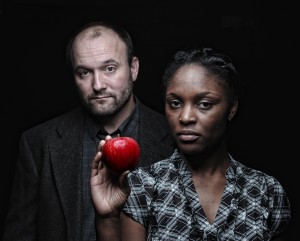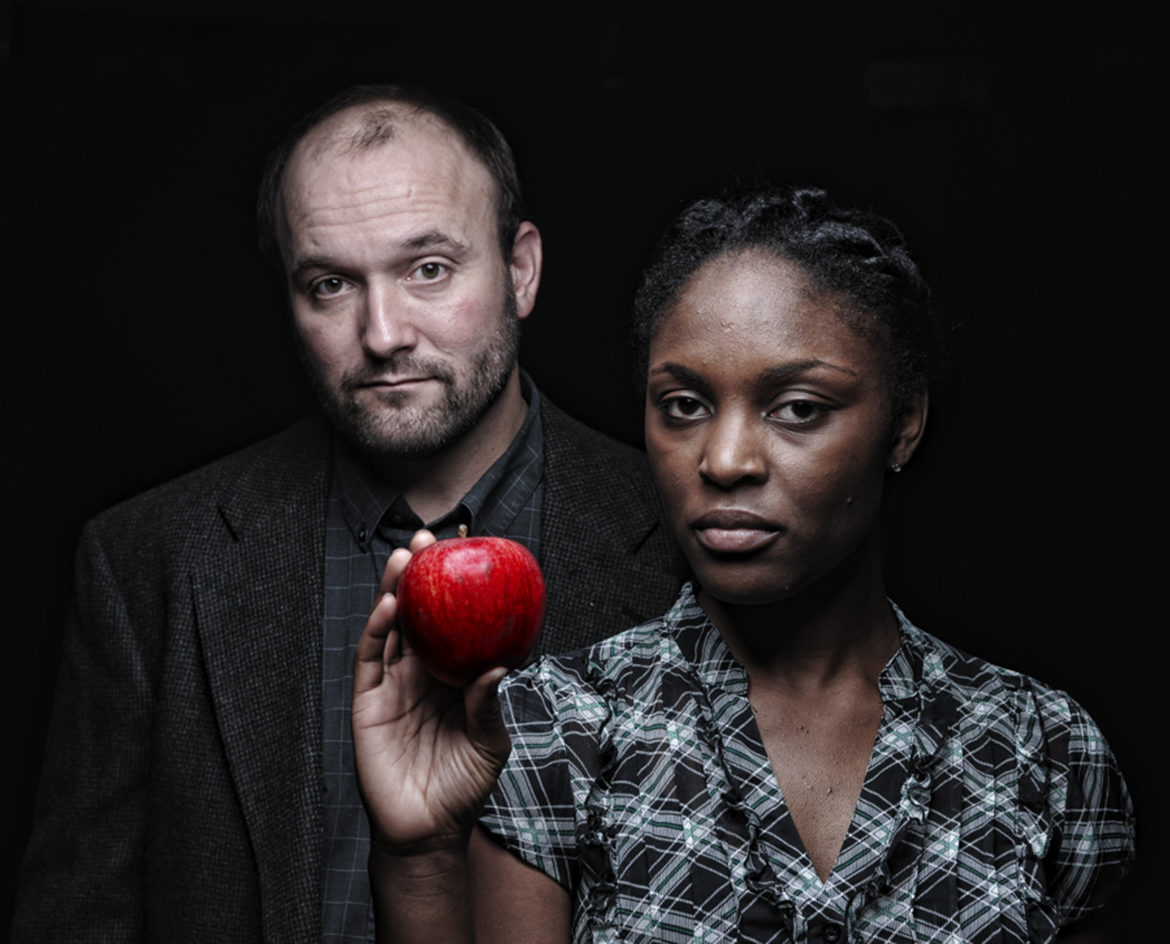Ah—Mamet. David Mamet first appeared on the country’s radar with his play American Buffalo in 1976; but it was 1984’s Glengarry Glen Ross that truly launched him into the nation’s zeitgeist. His was a style no one had ever seen before—one that has influenced every playwright since. His dialogue, while very precisely crafted for effect, is written in a sort of heightened “naturalism.” Characters interrupt each other—and themselves—constantly; their sentences trail off unexpectedly, or double back onto something said several lines back. They also finesse the meanings of words to suit their own ends. It can be daunting for an actor to memorize. Trust me, I know.

Paul Kuhn and Erica Hicks star in Curio Theatre Company's production of OLEANNA, running in Philadelphia through November 13.
I point this out because it is something the viewer needs to be aware of before seeing a Mamet play—you really need to listen.
OLEANNA was written in 1992 shortly after Clarence Thomas’ appointment to the Supreme Court. Anita Hill’s accusations of sexual harassment nearly derailed Thomas’ career [the debate still lingers as to whether he should be on the Court]; it also started a national conversation [or should I say argument] as to what is and isn’t sexual harassment. The play explores this murky area—and leaves the viewer in a quandary as to what really happened. The ultimate “He said/She said,” so to speak.
John, a middle-aged college professor on the brink of achieving tenure, is visited in his office by a student, Carol, who wishes to discuss her grade on a recent paper. The stakes are high for both of them: John must play the academia game until his tenure is confirmed and announced, and Carol must pass his course in order to remain in college. What ensues over the next 75 minutes is a power struggle.
They play is structured in three scenes. During the first, John [strongly played here by Paul Kuhn, Curio’s Artistic Director] is very controlling and condescending towards Carol [a solid Erika Hicks in a difficult role]. He interrupts her constantly, not really listen to what she is trying to say. He also takes several phone calls from his wife and realtor regarding a house he is attempting to purchase, in essence dismissing Carol’s presence and concerns. Carol comes across as very insecure; she is overwhelmed by his class and his manner of teaching. She speaks little, in a basic, halting vocabulary—a sharp contrast to John’s erudite manner. Carol gets increasingly upset and frustrated; towards the end of the scene she begs her professor to help her understand what he is teaching. John touches her shoulder to calm her. He tries to change the dynamic of their relationship by saying they won’t be teacher and pupil, but just two people talking. He tells her he likes her and offers to let her rewrite her paper. John guarantees her an “A” if she will meet with him one-on-one for the next couple of weeks to redo the class. He even takes the blame for her lack of understanding, stating he had personal matters on his mind that may have affected his teaching.
Scene Two takes place an indeterminate time later; as it unfolds, we see a shift in power between the two. Carol has accused John of sexual harassment; suddenly she is much more poised and her vocabulary is almost on a par with John’s from the previous scene. Ms. Hicks is much better with this material than that of Scene 1. John initially is still very condescending in his approach to her—he tells her the Tenure Committee will dismiss her charges. Carol is adamant in her course of action, revealing she has a “group” supporting her. She has registered a complaint, accusing him of being elitist and sexist, stating that he “tried to embrace the student while alone with her” and used the phrase “The White Man’s Burden.” By Scene Three, John is a disheveled shell of his former self. He has once again asked Carol to his office in a last ditch effort at…. God knows what.
I won’t reveal any more in the interest of not spoiling the ending for you.
Curio, and director Gay Carducci, have made some brave choices in their production. The first is the decision to perform the play in a smaller portion of their venue and set it in the round. This creates an intimacy for the viewers and the actors—we feel like we’re flies on the wall, as it were. The second is to create a set that is a giant turntable which ever so slowly turns during the course of the action—it felt like a giant clock ticking off the moments leading to an inevitable tragedy. The third is to bring race to the equation by casting Ms. Hicks, who is African-American, in the role of Carol. It added a whole new layer of subtext to the piece—especially the phrase “white man’s burden.”
And for the most part, it all works… Ms. Carducci’s direction is strong and assured; she keeps the pace crisp, giving her actors solid motivations for each move and gesture. She is abetted by Andrew Cowles’ lighting design, Aetna Gallagher’s costuming, Ian Rose’s fight direction and an uncredited sound design. Due to the nature of the space [a beautiful old West Philly church], there was a slight echo—which I’m sure is unavoidable, but it made some lines hard to understand at times. I also had some troubles hearing the actors when they had their backs to me, but that may just be me and my sinus issues. There was a very distracting bang periodically throughout the performance that I can only assume had to do with the mechanism controlling the turntable. These were minor issues that didn’t completely detract from my enjoyment of the production as a whole.
This was my first time attending a production at Curio—although I have wanted to see their work for some time now. Currently starting their sixth season, they have taken some very interesting risks that as a theatre artist intrigue me. I was most pleased with this experience and hope to get to see upcoming productions. They are doing a great job of bringing live theatre to West Philadelphia, have youth acting classes and have an extensive community outreach program. All things I support heartily.
OLEANNA
by David Mamet
Directed by Gay Carducci
October 14 – November 13, 2010
Curio Theatre Company
815 South 48th St.
Philadelphia, PA, 19143
215.525.1350
www.curiotheatre.org


